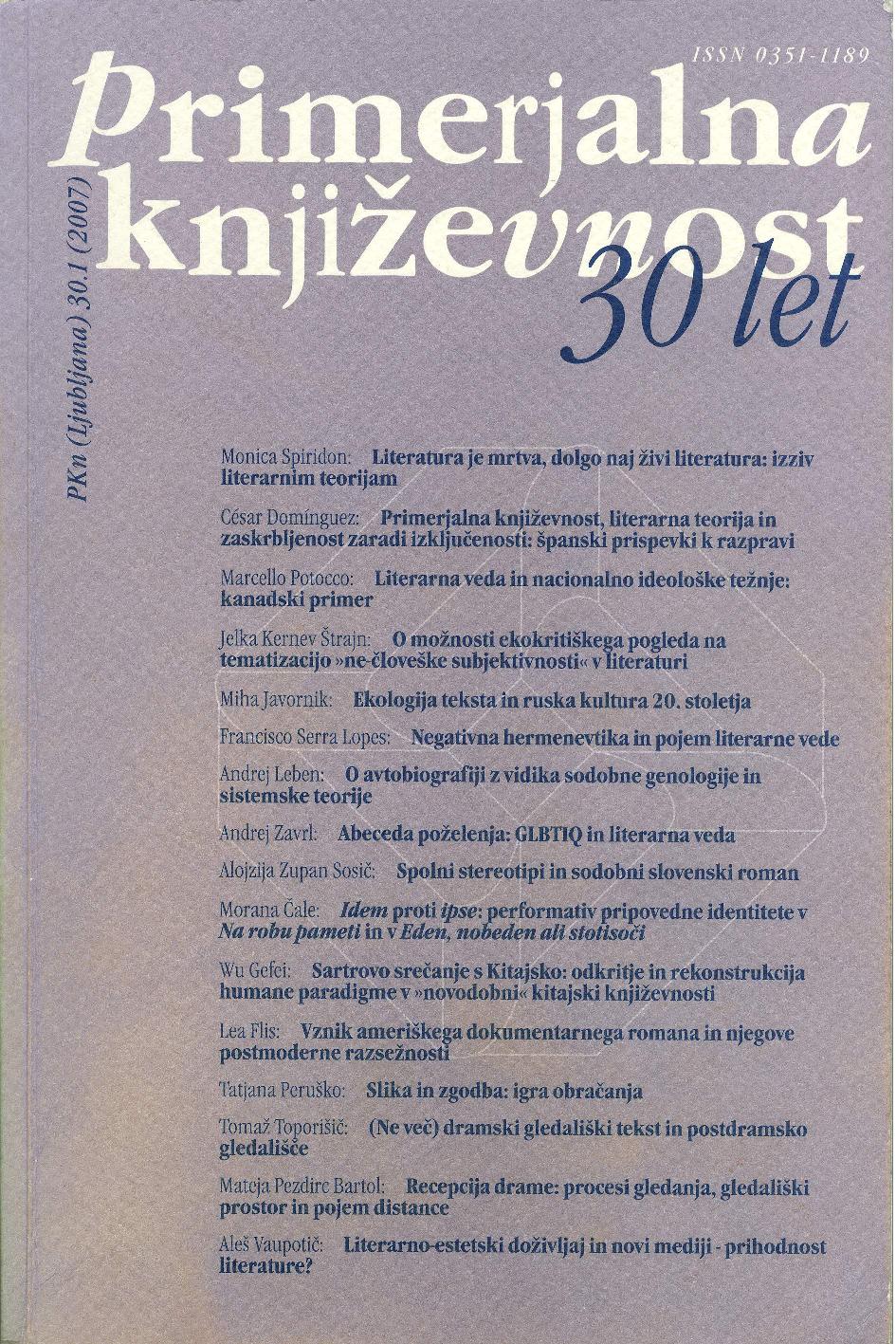The Alphabet of Desire: GLBTIQ and Literature
Keywords:
literary criticism, sexuality, gender studies, queer studies, gay literature, lesbian literatureAbstract
Sexuality has become a subject of passionate academic interest in recent decades, and this article is about “sexuality” a century and a half after its “invention” in the contexts of gay and lesbian literary studies and queer theory. The division between the two approaches to the study of sexuality is the division between the essentialist and constructivist notions of sexuality. The former argues for sexual types that are in one way or another inherent in human nature, whereas the latter sees them as socially constructed. Gay and lesbian studies started gaining prominence during the outset of the gay and lesbian liberation movement, and achieved broad recognition in the 1980s and 1990s. The central category of analysis and research in gay and lesbian studies is a clearly expressed sexual orientation, and this can be either homo- or heterosexual. This has led to the constitution of various campaigns and alliances, as well as concerted efforts at community-building and the promotion of positive images of gays and lesbians. At the end of the 20th century, the clear-cut borders and mutually exclusionary choices no longer seemed adequate to describe the modes of human (sexual) desire. To challenge object-choice-based gay and lesbian identities, which were perceived as restrictive and thus inadequate, a new category arose in the 1990s: that of queer. Queer theory employs gay and lesbian studies, feminism, historicism, cultural materialism, poststructuralism, and psychoanalysis, but it relies particularly on the Foucaultian and Butlerian concepts of sexuality and deconstructive textual analyses to question various oppositions, particularly the one between (sexual) subversion and (hetero)normativity. It is essential for queer theory to see the relevance of the textual negotiations of (varied and often unstable) sexualities rather than accepting stable sexual identities that respect, rather than cross, the borders between what is decent or indecent, acceptable or unacceptable, or gay or straight. Coming out, or outing someone, might fit well into the emancipationist gay and lesbian social narrative, but the accounts of literary texts that treat literature as a tool in the liberationists’ wider framework of social change will often prove unconvincing. However, while avoiding the traps of the essentialist position of gay and lesbian emancipation, we should be careful to take mundane social and historical realities into account as well.References
Apulej. Zlati osel (Metamorfoze). Prevedel in spremno besedo napisal Primož Simoniti. Ljubljana: Mladinska knjiga, 1997. (Veliki večni romani).
Barry, Peter. Beginning Theory: An Introduction to Literary and Cultural Theory. Manchester in New York: Manchester University Press, 1995.
Bertens, Hans. Literary Theory: The Basics. London in New York: Routledge, 2001.
Boccaccio, Giovanni. Dekameron. Prevedel Andrej Budal. Izbral in spremno besedo napisal Janko Kos. Ljubljana: Mladinska knjiga, 2003. (Klasiki Kondorja 42).
Bristow, Joseph. Sexuality. London in New York: Routledge, 1997.
Butler, Judith. Težave s spolom: Feminizem in subverzija spolne identitete. Prevedla Suzana Tratnik. Ljubljana: Škuc, 2001. (Lambda 19).
Chaucer, Geoffrey. The Canterbury Tales, The Riverside Chaucer. 3. izd. Oxford: Oxford University Press, 1988.
Dollimore, Jonathan. Sex, Literature and Censorship. Cambridge: Polity, 2001.
Foucault, Michel. Zgodovina seksualnosti. 1, Volja do znanja. Prevedel Brane Mozetič. Ljubljana: Škuc, 2000. (Lambda 15).
Halperin, David M. How to Do the History of Homosexuality. Chicago in London: The University of Chicago Press, 2004.
Higgins, Patrick. A Queer Reader. London: Fourth Estate, 1993.
Hugill, Barry. »Sex and Sexuality.« The Observer, 6. avgust 1995. <http://books.guardian.co.uk/departments/generalfiction/story/0,,102097,00.html> (10.02.2007).
Lilly, Mark. Gay Men’s Literature in the Twentieth Century. New York: New York University Press, 1993.
Marlowe, Christopher. Edvard Drugi. Prevedel Srečko Fišer. Gledališki list SNG Ljubljana 84.12 (2005): 53–100.
Martin, Robert K. in George Piggford. »Introduction: Queer, Forster?« Queer Forster. Ur. Robert K. Martin in George Piggford. Chicago in London: The University of Chicago Press, 1997. 1–28.
McAlpine, Monica E. »The Pardoner’s Homosexuality and How It Matters.« PMLA 95 (1980): 8–22.
Moran, Joe. Interdisciplinarity. London in New York: Routledge, 2002.
Sedgwick, Eve Kosofsky. Epistemology of the Closet. Berkeley in Los Angeles: University of California Press, 1990.
– – –. »Paranoid Reading and Reparative Reading, or, You’re So Paranoid, You Probably Think This Introduction Is about You.« Novel Gazing: Queer Readings in Fiction. Ur. Eve Kosofsky Sedgwick. Durham in London: Duke University Press, 1997. 1–37.
Sinfield, Alan. Cultural Politics – Queer Reading. London: Routledge, 1994.
– – –. The Wilde Century: Effeminacy, Oscar Wilde and the Queer Moment. New York: Columbia University Press, 1994.
Tóibín, Colm. Love in a Dark Time: Gay Lives from Wilde to Almodóvar. London: Picador, 2003.
Virk, Tomo. Moderne metode literarne vede in njihove filozofsko teoretske osnove: Metodologija 1. Ljubljana: Filozofska fakulteta, Oddelek za primerjalno književnost in literarno teorijo, 2003.
Woods, Gregory. A History of Gay Literature: The Male Tradition. New Haven in London: Yale University Press, 1998.
Woolf, Virginia. »Women Novelists.« Contemporary Writers. London: The Hogarth Press, 1965. 24–27.
Zimmerman, Bonnie. »What Has Never Been: An Overview of Lesbian Feminist Literary Criticism.« Feminist Literary Theory: A Reader. 2. izd. Ur. Mary Eagleton. Oxford: Blackwell, 1996. 18–24.


